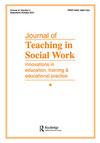Linking Social Work Licensure Examination Pass Rates to Accreditation: The Merits, Challenges, and Implications for Social Work Education
IF 0.9
Q3 EDUCATION & EDUCATIONAL RESEARCH
引用次数: 2
Abstract
ABSTRACT Unlike other disciplines, social work has made accreditation decisions about undergraduate and graduate programs independent of licensure examination pass rates of graduates. While education, regulation, and practice are heralded as the three pillars of social work, there have been few meaningful linkages between them. Despite recognition that licensure impacts employment opportunities and salaries of social workers, the academy has been resistant to bridge the divide between educational assessment and licensure outcomes, resulting in hardship for some graduates. Students choose social work programs without knowing whether their education is adequate to pass “high stakes” licensure exams. In an era of greater accountability, and questions about the value of higher education, making licensure examination pass rates public and linking them to decisions when accrediting programs, seems prudent. However, this policy shift would likely change market demands and the stability of accreditation decisions enjoyed by social work programs to date.将社会工作执照考试通过率与认证联系起来:社会工作教育的优点、挑战和影响
与其他学科不同,社会工作对本科和研究生课程的认证决定独立于毕业生的执照考试合格率。虽然教育、监管和实践被誉为社会工作的三大支柱,但它们之间几乎没有什么有意义的联系。尽管认识到执照会影响社会工作者的就业机会和工资,但学院一直拒绝弥合教育评估和执照结果之间的鸿沟,导致一些毕业生陷入困境。学生选择社会工作项目时,并不知道他们的教育是否足以通过“高风险”的执照考试。在一个责任更大、高等教育价值受到质疑的时代,公开执照考试合格率,并将其与认证项目的决定联系起来,似乎是明智的。然而,这一政策转变可能会改变市场需求和社会工作项目迄今为止所享有的认证决定的稳定性。
本文章由计算机程序翻译,如有差异,请以英文原文为准。
求助全文
约1分钟内获得全文
求助全文
来源期刊

Journal of Teaching in Social Work
EDUCATION & EDUCATIONAL RESEARCH-
CiteScore
1.20
自引率
0.00%
发文量
36
期刊介绍:
The Journal of Teaching in Social Work fills a long-standing gap in the social work literature by providing opportunities for creative and able teachers—in schools, agency-based training programs, and direct practice—to share with their colleagues what experience and systematic study has taught them about successful teaching. Through articles focusing on the teacher, the teaching process, and new contexts of teaching, the journal is an essential forum for teaching and learning processes and the factors affecting their quality. The journal recognizes that all social work practitioners who wish to teach (whatever their specialty) should know the philosophies of teaching and learning as well as educational methods and techniques.
 求助内容:
求助内容: 应助结果提醒方式:
应助结果提醒方式:


